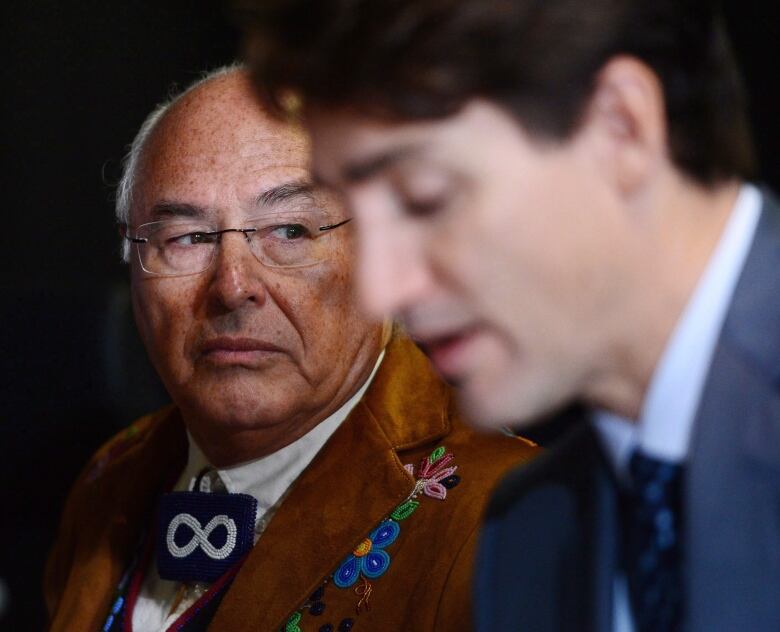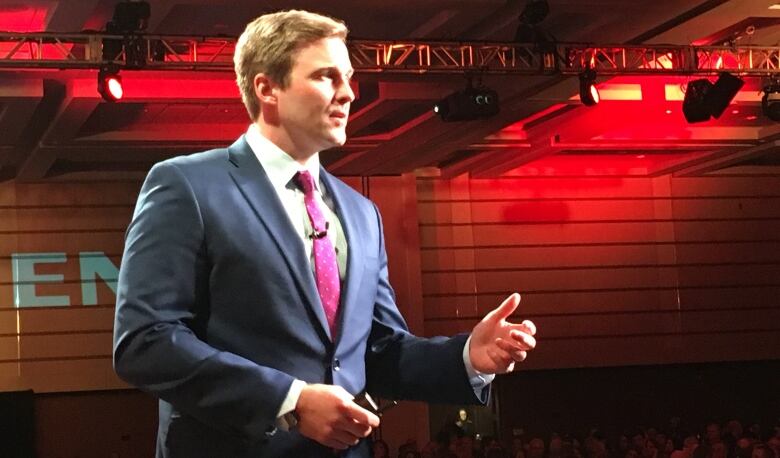Indigenous leaders turn down invitation to meeting of premiers
'There really wasnt much that came out of these meetings other than talk,' Mtis president says

There's still a meeting scheduled for next weekbetween Canada's premiers and Indigenous organizations, but it won't include the leaders of the Assembly of First Nations, the Inuit Tapiriit Kanatami or the Mtis National Council. They're all declining the Council of the Federation's invitation again this year.
The threeorganizations cite different reasons for their absence, but the end result for the first day of the summer premiers' meetingremains the same as it was in 2017: the conversation won't include the three leaders who represent the largest number of First Nations, Inuit and Mtis people in Canada.
New Brunswick is hosting this summer's meetingat Pays de la Sagouine in Bouctouche, as it takesover as thechair of the Council of the Federation.
In response to a questionabout exactly who was expected to attend, aspokesperson for New Brunswick's executive council officereported that all she could say is that organizers are still receiving RSVPs and confirmations on attendance.
Before last year's talks in Edmonton, AFNNational Chief Perry Bellegarde, ITKPresident Natan Obed and Mtis National Council President Clment Chartiercalled a news conference in Toronto to tell the media they would not participate.
"We are not just another special interest group," Bellegardesaid back then.
Bellegarde hasn't changed his mind. He said in a statement to CBCNews Thursday that he's notgoing again this year because there's been no progress in addressing his organization's concerns.
He also criticized "moves by premiers to minimize First Nations participation not only in meetings with premiers, but all federal-provincial-territorial ministerial level meetings."
Regional chief no longer going
The AFNwas planning to send a regional chief to the gathering, but on Thursday that changed.
Bellegarde's statement said "First Nations leadership identified on the draft agenda had not been contacted and had not received invitations to date or [been] treated with appropriate protocol and respect."
A smaller meetingbetween the premiers and the Congress of Aboriginal Peoples (CAP) which represents Indigenous people living off-reserve in Canada and the Native Women's Association of Canada (NWAC) is expected toproceed, as it did in Edmonton.
Robert Bertrand, CAP's national chief, will be participating in next week's talks. He toldCBCNews Thursday that it's not too often that NWAC and CAP get this much face-time with the premiers to discuss the problems facing off-reserve Indigenous people and he found last year's session valuable.
He said heheard from NWAC'spresident,Francyne Joe, that she'll be there as well.
"I find for us it's an excellent way of meeting the new premiers," he said, without speculating on why other Indigenous leaderswere staying away. "It's a win-win situation."
He said the group's agenda for the meetingincludes discussions ofIndigenous children in care and economic development.
Not 'organizations' but 'governments'
Explaining his reasons for skipping the meeting again this year, Chartiersaid the premiers "don't respect the fact that the inherent right of self-government is alive and well in this country." When the New Brunswick organizers refer to what he leads as simply a"national Indigenous organization,"they failto recognize its status as the national government of the Mtisnation, he said.
"We're not invited as representatives of governments," he said.
Chartiersaid that, as recently as last December, the outgoing chair of the Council of the Federation Alberta Premier Rachel Notley wrote a letter trying to directthe federal government in how it deals with his group, something he described as an act of"marginalization and non-recognition of our representativity of our nations and peoples."
At issueis whether there are two levels of government in Canada federal and provincial or three, including First Nations, Inuit and Mtisrepresentation.

The leaders of the Assembly of First Nations, the InuitTapiriitKanatamiand theMtisNational Council say they don't appreciate being invited to meet alongsideother organizations that represent Indigenous people but are not recognized governments ofsovereign nations.
Chartier said he's heard that the Women of the MtisNation also wereinvited this year a group not recognized as having the same status as theMtisNational Council.
"Because nothing has changed, the Metis Nation will not be accepting the invitation to attend," he said.
Elections, scheduling conflicts this month
Bellegardeis up for re-election when the AFNgathers later this month.
In apre-election period, the national chief relinquishes some administrative and financial authority and must limit his use of resources to AFNbusiness but meeting with provincial and territorial premiers is part of the job of the national chief.
For its part,ITKhasascheduling conflict next week.
The 13thgeneral assembly of the Inuit Circumpolar Council takes place in Utqiagvik, Alaska July 16-19. Themeeting is heldonceevery four years, and elections are being held at this gathering as well.
ITK's president,Obed,willleadCanada's delegation in Alaska. Any potential alternates that could have been sent to meet with the premiers in his place will also be in Alaska, ITKspokesperson Erin Brandt Filliter told CBCNews.
Filliter also suggested to CBCthat, for ITK, last year's absence was motivated by the way the agenda was set for the talks, with the premiers seen as telling the Indigenous organizations what would be up for discussion.
Jared Wesley, a University of Alberta professor who studies the Council of the Federation, disagrees with the characterization of the premiers' agenda-setting as top-down. It's consensus-based, he said.
Some provinces were upset by what happenedlast year because they'd spent months negotiating an agenda they believed everyone was happy with, he wroteCBCNews Wednesday.
Typo trouble
Chartierread the invitationthe MtisNational Council received from Gallant's office aloud during his interview with CBCNews. It contained what he called "sloppy penmanship": the letter invited Chartier to meet with his own organization, the Mtis National Council, among a list of inviteesthat did not include the AFN.
Itmight have been acopying and pasting error, but considering it's an official letter, he wasn't impressed.
"My officials will be in contact with your organization to seek your input on the development of the agenda for our discussion," Chartiersaid, reading more from the invitation. In fact, he said, no one contacted his office.
Chartieris a veteran of premiersmeetings, dating back over a decade. He said he's seen fewresults coming from them, aside from their past success in getting the premiers to call for a national inquiry on missing and murdered Indigenous women something he called a "no-brainer."

There was a time when premiers and Indigenous leaders made common cause against what they saw asan unsympathetic federal Conservative government led by Stephen Harper, he said.
But the Mtis, he said,are happierwith the progress they've seen on their issues through working directly with Justin Trudeau's Liberal government.
Issues around Mtis membership criteria and the recognition of their rights remain, but Chartiersaida national meeting is less relevant to him than a gathering of just the Western premiers who represent thejurisdictions across his people's homeland.
The larger discussions only work well for discussing broad principles like child welfare, he said.
"There reallywasn't much that came out of these [past premiers] meetings other than talk," he said.
As for the question of why the premiers aren't open to changing the format of the talks, or limiting who'sinvited, Chartiersaid hebelieves that's rooted in a possiblethreat to the premiers' self-interest.
"The more Indigenous governments are recognized and the more transfer payments go directly to Indigenous governments, perhaps they fear they're going to be losing some of their transfer payments," he said.
No official boycott was co-ordinated between the three groups this time, he said, although they do speak informally on a regular basis.
"It's not a boycott. I just didn't accept the invitation."












_(720p).jpg)


 OFFICIAL HD MUSIC VIDEO.jpg)
.jpg)



























































































